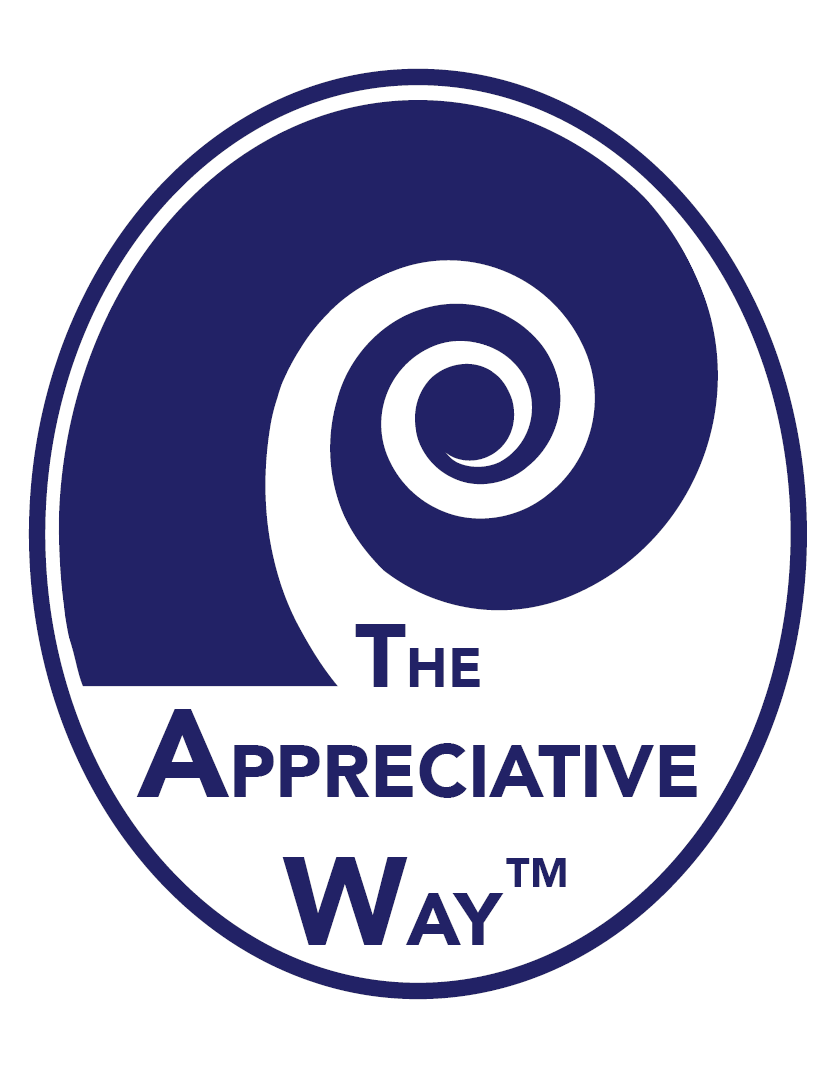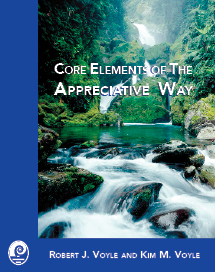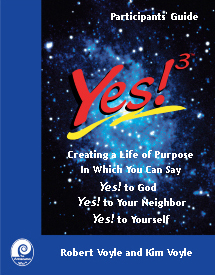

The Appreciative Way

Discover the essentials of the
Appreciative Way in this fast
read format book by Rob and
Kim Voyle.
Welcome to Yes!3
Yes!3 is designed to help you
grow an appreciative culture
within your congregation by
helping parishioners create
a purpose centered life
in which they can say:
Yes! To God
Yes! To Their Neighbor
Yes! To Them Self
Training in The
Appreciative Way
All of our Coaching, Ministry and Leadership training programs are based on the Appreciative Way.
We offer a blend of residential intensives and teleconferences to train you to appreciatively use your gifts for the benefit of others.
Appreciative Coaching
Our appreciative way of coaching uniquely blends:
- Appreciative Inquiry
- Milton Erickson
- Contemplative Spirituality
Coaching Services
Appreciative Coaching can be used in a variety of settings and for many purposes.
Here are just some of the types of coaching services we provide.
- Clergy Coaching
- Leadership Development
- Executive Coaching
- Career Coaching
- Life Coaching
- Spiritual Direction
Subscribers receive monthly Appreciative Tips and notification of our upcoming training programs.
Privacy: We never rent, sell, or share your email.
Appreciative Inquiry Resources
This page has links to a variety of interview protocols and other resources that are available in ".pdf" format. You may use these in their entirety or adapt them for use to meet a specific need. These resources will also describe some of the appreciative inquiry strategies and outlook.
![]() Note: Many of the resources are provided in ".pdf" format.
Note: Many of the resources are provided in ".pdf" format.
Click on the button to obtain a free copy of Acrobat Reader.
If you have created protocols for specific needs and would like to share them with others, we would be happy to post them here with attribution to you and your work. For more information about posting a resource contact Rob Voyle
Program Handouts
If you have attended a Training Program you can find additional resources at: Training Handouts.
Appreciative Inquiry Resources
- Appreciative Inquiry generic interview guide for churches.
This guide has the four generic questions used in an initial discovery process for developing an organizational strategic plan or sense of mission for a church. If a congregational has a poorly defined sense of mission or is seeking a major organizational redevelopment this guide is a useful beginning place. Depending on the information discovered a more specific interview guide may be developed to inquire specifically into areas that the generic uncover. - Appreciative Inquiry guide based on the great commandment.
This guide was developed to help a congregation discover and grow the ways they love God, neighbor, and themselves. The interview is presented as a worksheet that provides places for people to record their answers and those of their group and questions to facilitate a synthesis of the discovery. - Appreciative Inquiry generic interview guide for organizations.
This is a similar four generic questions designed for use in a secular organization rather than a church. - Guide to Training Interviewers.
Developed by John Robinson this guide provides an outline for training church members in the art of appreciative interviewing.
The following interview guides are designed to meet specific needs and show how the interview process can be developed to inquire into any aspect of corporate or individual life.
- Appreciative Inquiry interview guide for work place introductions.
This interview guide can be used to introduce people to one another as part of developing team cohesiveness. - Vestry Retreat Interview Guide.
This interview guide is designed for a Vestry retreat to:
Positively energize members of the Vestry,
Develop strategic plans and goals for the year,
Make explicit what is valuable in the congregation,
Make the vestry experience creative and rewarding. - Church Council retreat interview guide.
This is the same as the Vestry guide with language changed for use
with a "Church Council." - Interview guide for personal ministry development.
This guide was developed as part of a ministry development guide in which the participants learned the process of appreciative inquiry by conducting an inquiry into their own ministry. From the basis of the inquiry participants ere then able to articulate their own personal mission or vocation - Interview guide for clergy beginning new ministry.
This guide was developed to identify positive experiences and resources related to making personal changes. It was used as part of a retreat for clergy beginning new ministries. - Making our Church a safe place for children.
This interview guide was developed as a partial alternative to traditional child abuse prevention seminar materials mandated for Sunday school teachers and youth workers. Rather than focus on "what not to do" this interview guide seeks stories of participant's experiences of being treated with dignity and being safe as a child. This material is then incorporated into teaching participants how to increase the safety of children in church settings. - Interview guide for compassion. The interview guide is based on the work of Stephen Gilligan's three facets of compassion: tenderness, fierceness, and mischievousness. It was used as part of a daylong workshop entitled: "Compassion a way of being in the world." Compassion: The Crazy Wisdom of Jesus. This article on compassion by Rob Voyle is based on Gilligan's work and is a chapter from a forth coming book and examines the ways Jesus used the three facets and how we can use them in our work.
Additional Resources
- Imagine a church protocol.
This protocol is a guided imagery exercise for use after the Discovery phase and part of the Dream phase. Participants are invited to imagine a church in which the best experiences, values and wishes from the Discovery phase are incorporated. This imagined church is then used as a basis for creative art work prior to writing a mission statement or "Provocative propositions" as they are known in AI circles. - Appreciative Inquiry 5D Model for churches.
This one page model contains the spiral and explanation found on the Appreciative Inquiry page. The model is suitable as a handout for use in introducing appreciative inquiry to others interested in its application in churches. - Appreciative Inquiry 5D Model for organizations.
This is a one page model generic model that is suitable as a handout for use in introducing appreciative inquiry to others in secular settings. - Transactional Analysis and Appreciative Inquiry .
This model uses the " I'm OK, You're OK" language of Transactional Analysis to describe how we use appreciative inquiry to provide a context for people to engage one another in a mutual affirming "We are OK" manner. - Ministry Valuation Page.
This page contains a description and rationale for using an appreciative inquiry process as part of a review of a congregation's ministry. A comparison of traditional performance appraisals and an appreciative process is described. - Additional resources and links can be found on the literature and links pages.
